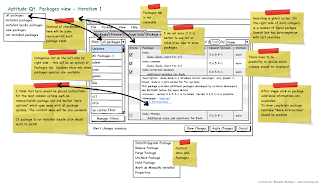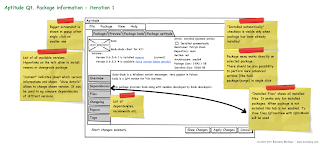There are a number of documents about how to permit ssh access
to run
rsync or
unison for remote
synchronisation by an appropriate configuration of the
authorized_keys file. Of these the best two are
probably those by
St phane Kattoor and
Christian 'Greek0'
Aichinger.
Joey Hess also explains some of the pitfalls.
The problem is the familiar one: to limit the file-system
hierarchy accessible. The humble
chroot is a natural
way to implement such restrictions which is probably what led
"Greek0" to suggest the use of
dchroot.
This is indeed a fine solution ... except, how does one
implement it if one is
not root on the server
machine?
WARNING: The rest of this entry is wrong as was
pointed
out by Joey Hess. See the update at the bottom.
The package
fakechroot by Piotr Roszatycki
provides a way out.
The problem I had was as follows:
- I want to share a certain sub-tree of
$HOME
using unison.
- I am OK with sharing whatever access I give to
/bin, /lib and /usr in
the process.
- I do not have root access to the machine.
A recent enough version of
fakechroot (version
2.8 worked) allows one to do make use of environment variables as
follows:
LD_PRELOAD=libfakechroot.so
LD_LIBRARY_PATH=/usr/lib/fakechroot:/usr/lib64/fakechroot:/usr/lib32/fakechroot:/usr/lib:/lib
FAKECHROOT=true
FAKECHROOT_VERSION=2.8
FAKECHROOT_EXCLUDE_PATH=/bin:/lib:/usr
export LD_LIBRARY_PATH LD_PRELOAD
export FAKECHROOT_EXCLUDE_PATH FAKECHROOT FAKECHROOT_VERSION
After this setup one can run
HOME=/ chroot $HOME/some/dir /usr/bin/unison -server
and the unison server will only be able to view
/bin,
/lib,
/usr and
$HOME/some/dir; the latter will be mapped to
/. (One needs to set the
$HOME variable
to something sensible for
unison to function.)
One should not be tempted to create subdirectories of
$HOME/some/dir containing only the "relevant"
portions of the system directories for
unison. The
reason is that those files will be created
as
me and so could be overwritten by
unison.
The creation of a suitable entry in
authorized_keys to use this is an easy exercise!
UPDATE: As Joey Hess has noted:
Taking a program, be it fakechroot or unison, that was never
designed with security in mind, and trying to use it as a
security barrier, is an open invitation to pain.
I
had thought about the problem of uploading
static-linked binaries and had imagined that it had been
overcome. However, the basic facts in this case are:
unison -server does not have an
option to limit its view of the directory heirarchy. The
upstream authors are aware of this but it is not clear whether
they perceive it as a bug.fakechroot is meant to give a different view
of the directory heirarchy to programs that use standard
libc calls. It does not block access to
part of the tree as the real chroot does; again, this is not
necessarily a bug.
 GSoC 2010 is over for some time and I should write some summary how students
projects ended up. The very short summary is that all five students were
successful and their work got merged. Follows description of the project in no
particular order.
Thanks to Martynas Mickevicius you can now get charts out of various parts of
phpMyAdmin. They are used on server status pages or you can get query results in
form of several charts. It seems to work pretty well at least what I've tried
so far.
Ankit Gupta was working on Visual Query Builder for phpMyAdmin. Unfortunately
this is only project which is not yet merged to master branch, mostly because
some UI things were not yet finished. But hopefully it will be merged soon.
Adnan Mughal was converting our schema export feature from PDF to support
multiple formats. You can now get the schema as SVG, DIA or even Visio
formats, some of them will require a little bit of tuning still, because the
scaling is not perfect.
Ninad Pundalik did a lot of work on AJAXifying phpMyAdmin. His changes touched
quite a lot of places and there are still some rough edges (as you can see in our
bug tracker), but this is definitely welcome improvement and I hope it will
get stable soon.
Piotr Przybylski basically continued in his effort two years ago when he had
reimplemented setup script and now he had focused on user configuration. It
can be stored in session, browser local storage (HTML 5 feature) or in
separate table in phpMyAdmin configuration storage (that's new name for
pmadb). This is something what people were requesting for very long time and
I'm happy we can finally bring this feature.
And last but not least is Lorikeet Lee, who spend lot of time on tuning user
interface of phpMyAdmin. The most visible changes are on export and import
pages, which now should be less scaring for new users, but there are other
changes in lot of other places, for example the main page.
Generally it was a great summer and I hope we will be so successful also next
year.
PS: You can try all these features on http://demo.phpmyadmin.net/.
GSoC 2010 is over for some time and I should write some summary how students
projects ended up. The very short summary is that all five students were
successful and their work got merged. Follows description of the project in no
particular order.
Thanks to Martynas Mickevicius you can now get charts out of various parts of
phpMyAdmin. They are used on server status pages or you can get query results in
form of several charts. It seems to work pretty well at least what I've tried
so far.
Ankit Gupta was working on Visual Query Builder for phpMyAdmin. Unfortunately
this is only project which is not yet merged to master branch, mostly because
some UI things were not yet finished. But hopefully it will be merged soon.
Adnan Mughal was converting our schema export feature from PDF to support
multiple formats. You can now get the schema as SVG, DIA or even Visio
formats, some of them will require a little bit of tuning still, because the
scaling is not perfect.
Ninad Pundalik did a lot of work on AJAXifying phpMyAdmin. His changes touched
quite a lot of places and there are still some rough edges (as you can see in our
bug tracker), but this is definitely welcome improvement and I hope it will
get stable soon.
Piotr Przybylski basically continued in his effort two years ago when he had
reimplemented setup script and now he had focused on user configuration. It
can be stored in session, browser local storage (HTML 5 feature) or in
separate table in phpMyAdmin configuration storage (that's new name for
pmadb). This is something what people were requesting for very long time and
I'm happy we can finally bring this feature.
And last but not least is Lorikeet Lee, who spend lot of time on tuning user
interface of phpMyAdmin. The most visible changes are on export and import
pages, which now should be less scaring for new users, but there are other
changes in lot of other places, for example the main page.
Generally it was a great summer and I hope we will be so successful also next
year.
PS: You can try all these features on http://demo.phpmyadmin.net/.







 So. I was wondering, which nice distro specific tools do exist in debian/gnome or in $other/kde that debian/kde is missing?
We have
So. I was wondering, which nice distro specific tools do exist in debian/gnome or in $other/kde that debian/kde is missing?
We have  I d like to extend a warm welcome to our selected students for the 2010 Debian Google Summer of Code!
They should pop up on Debian Planet soon and you re welcome to come talk to them on #debian-soc on irc.debian.org
Aptitude Qt
by Piotr Galiszewski, mentored by Sune Vuorela
Qt GUI for aptitude. Currently, KDE users need to use Aptitude via the console interface, or install the newly developed GTK frontend, which does not fit well into KDE desktop. Making Qt frontend to Aptitude would solve this problem and bring an advanced and fully Debian-compliant graphical package manager to KDE.
Content-aware Config Files Upgrading
by Krzysztof Tyszecki, mentored by Dominique Dumont
When a package deliver configuration files, the problem of merging user data with new configuration instructions will arise during package upgrades on users systems. Sometimes merging can be done with 3 way merge, but this process does not insure that the resulting file is correct or even legal. This project intends to create standards, tools an heuristics to make the scary config file conflict resolution debconf prompt a thing of the past.
Debbugs Bug Reporting and Manipulation API
by David Wendt Jr., mentored by Bastian Venthur
Currently debbugs supports a SOAP interface for querying Debian s Bug Tracking System. Unfortunately this operation is read-only. This project would create an API for debbugs which supports sending and manipulating bug reports, without having to resort to email. This project does not intend to replace email as mean to manipulate the BTS but rather to enhance the BTS to allow other means of bug creation and manipulation.
Debian High Performance Computing on Clouds
by Dominique Belhachemi, mentored by Steffen Moeller
The project paves a way to combine the demands in high performance computing with the dynamics of compute clouds with Debian. Combining the Eucalyptus cloud computing infrastructure with the TORQUE resource manager and preparing the components for dynamically added and removed instances provides the user with a attractive high performance computing environment. Such a system allows users to share resources with large compute centers with minimal changes in their workflow and scripts.
Debian-Installer on Neo FreeRunner and Handheld Devices
by Thibaut Girka, mentored by Gaudenz Steinlin
This project aims to improve the installation experience of Debian on handheld devices by replacing ad-hoc install scripts by a full-blown and adapted Debian-Installer. The Neo FreeRunner is used as it is the most convenient and open device from a development standpoint, but other devices will also be explored.
Hurd port and de-Linux-ization of Debian-Installer
by J r mie Koenig, mentored by Samuel Thibault
The primary means of distributing the Hurd is through Debian GNU/Hurd. However, the installation CDs presently use an ancient, non-native installer. The goal of this project is to port the missing parts of Debian-Installer to Hurd. To achieve this, all problematic Linux-specific code in Debian-Installer will be replaced by less or non-kernel dependent code, paving the way for better support of other non-Linux ports of Debian.
Multi-Arch support in APT
by David Kalnischkies, mentored by Michael Vogt
Hardware like 64bit processors are perfectly able to execute 32bit opcode but until now this potentiality is disregard as the infrastructure tools like dpkg and APT are not able to install and/or solve dependencies across multiple architectures. The project therefore focuses on enabling APT to work out good solutions in a MultiArch aware environments without the need of hacky and partly working biarch packages currently in use.
Package Repository Analysis and Migration Automation
by Ricardo O Donell, mentored by Neil Williams
Emdebian uses a filter to select packages from the main Debian repositories that are considered useful to embedded devices, excluding the majority of packages. The results of processing the filter are automated but maintaining the filter list is manual. This project seeks to automate certain elements of the filtering process to cope with specific conditions. This project will also generalize to more elaborate and intelligent algorithms to improve the transitions of the main Debian archives.
Smart Upload Server for FTP Master
by Petr Jasek, mentored by Joerg Jaspert
Making packages upload smarter, more interactive and painless for uploaders by switching from anonymous FTP and Cron jobs to a robust protocol and modern package checking and processing daemon. This daemon would test early and report early, saving developers time.
I d like to extend a warm welcome to our selected students for the 2010 Debian Google Summer of Code!
They should pop up on Debian Planet soon and you re welcome to come talk to them on #debian-soc on irc.debian.org
Aptitude Qt
by Piotr Galiszewski, mentored by Sune Vuorela
Qt GUI for aptitude. Currently, KDE users need to use Aptitude via the console interface, or install the newly developed GTK frontend, which does not fit well into KDE desktop. Making Qt frontend to Aptitude would solve this problem and bring an advanced and fully Debian-compliant graphical package manager to KDE.
Content-aware Config Files Upgrading
by Krzysztof Tyszecki, mentored by Dominique Dumont
When a package deliver configuration files, the problem of merging user data with new configuration instructions will arise during package upgrades on users systems. Sometimes merging can be done with 3 way merge, but this process does not insure that the resulting file is correct or even legal. This project intends to create standards, tools an heuristics to make the scary config file conflict resolution debconf prompt a thing of the past.
Debbugs Bug Reporting and Manipulation API
by David Wendt Jr., mentored by Bastian Venthur
Currently debbugs supports a SOAP interface for querying Debian s Bug Tracking System. Unfortunately this operation is read-only. This project would create an API for debbugs which supports sending and manipulating bug reports, without having to resort to email. This project does not intend to replace email as mean to manipulate the BTS but rather to enhance the BTS to allow other means of bug creation and manipulation.
Debian High Performance Computing on Clouds
by Dominique Belhachemi, mentored by Steffen Moeller
The project paves a way to combine the demands in high performance computing with the dynamics of compute clouds with Debian. Combining the Eucalyptus cloud computing infrastructure with the TORQUE resource manager and preparing the components for dynamically added and removed instances provides the user with a attractive high performance computing environment. Such a system allows users to share resources with large compute centers with minimal changes in their workflow and scripts.
Debian-Installer on Neo FreeRunner and Handheld Devices
by Thibaut Girka, mentored by Gaudenz Steinlin
This project aims to improve the installation experience of Debian on handheld devices by replacing ad-hoc install scripts by a full-blown and adapted Debian-Installer. The Neo FreeRunner is used as it is the most convenient and open device from a development standpoint, but other devices will also be explored.
Hurd port and de-Linux-ization of Debian-Installer
by J r mie Koenig, mentored by Samuel Thibault
The primary means of distributing the Hurd is through Debian GNU/Hurd. However, the installation CDs presently use an ancient, non-native installer. The goal of this project is to port the missing parts of Debian-Installer to Hurd. To achieve this, all problematic Linux-specific code in Debian-Installer will be replaced by less or non-kernel dependent code, paving the way for better support of other non-Linux ports of Debian.
Multi-Arch support in APT
by David Kalnischkies, mentored by Michael Vogt
Hardware like 64bit processors are perfectly able to execute 32bit opcode but until now this potentiality is disregard as the infrastructure tools like dpkg and APT are not able to install and/or solve dependencies across multiple architectures. The project therefore focuses on enabling APT to work out good solutions in a MultiArch aware environments without the need of hacky and partly working biarch packages currently in use.
Package Repository Analysis and Migration Automation
by Ricardo O Donell, mentored by Neil Williams
Emdebian uses a filter to select packages from the main Debian repositories that are considered useful to embedded devices, excluding the majority of packages. The results of processing the filter are automated but maintaining the filter list is manual. This project seeks to automate certain elements of the filtering process to cope with specific conditions. This project will also generalize to more elaborate and intelligent algorithms to improve the transitions of the main Debian archives.
Smart Upload Server for FTP Master
by Petr Jasek, mentored by Joerg Jaspert
Making packages upload smarter, more interactive and painless for uploaders by switching from anonymous FTP and Cron jobs to a robust protocol and modern package checking and processing daemon. This daemon would test early and report early, saving developers time.



 Getting python2.6 as the default ASAP is currently the #1 priority for the Python modules team. I also consider it very important and tried to help with it, but it is starting to get depressing.
The plan is to fix all packages in unstable to be compatible with python2.6 first. This would be easy if there hadn t been a very badly planned change in the installation paths that came together. Because of it, quite a number of packages have to be fixed. Two months ago, I filed a lot of
Getting python2.6 as the default ASAP is currently the #1 priority for the Python modules team. I also consider it very important and tried to help with it, but it is starting to get depressing.
The plan is to fix all packages in unstable to be compatible with python2.6 first. This would be easy if there hadn t been a very badly planned change in the installation paths that came together. Because of it, quite a number of packages have to be fixed. Two months ago, I filed a lot of 
 The Debian Python Modules Team is
The Debian Python Modules Team is